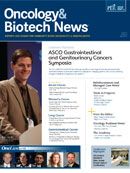Publication
Article
Oncology & Biotech News
Current State of the Art for Treatment of Prostate Cancer
Author(s):
An interview with Nicholas J. Vogelzang, MD, during the ASCO 2012 Genitourinary Cancers Symposium, about treatment of prostate cancer and unmet needs.
Nicholas J. Vogelzang, MD
During the ASCO 2012 Genitourinary Cancers Symposium, OBTN spoke with Nicholas J. Vogelzang, MD, chair and medical director of the Developmental Therapeutics Committee at US Oncology Research, Las Vegas, Nevada, about treatment of prostate cancer and unmet needs.
OBTN: Have there been any major advances in diagnosing prostate cancer? Dr. Vogelzang: We are getting better at diagnosing prostate cancer. Fluoride 18 PET [positron-emission tomography] scans are detecting more cancers. Circulating tumor cells are used in more advanced disease, and MRI [magnetic resonance imaging] is helpful for diagnosing earlier metastatic disease.
What about treatment? How has treatment changed over the past several years?
Historically, we treated at three different peaks in the natural history of prostate cancer, using local therapy for localized disease, hormonal therapy for metastatic disease, and chemotherapy with docetaxel at advanced disease. Now we have expanded our ability to treat and we intervene at six different peaks.
What are those peaks, or opportunities, and what are the available treatments?
We still treat localized disease with local therapy, but we have better local therapy, including adjuvant radiation therapy and adjuvant riskbased hormonal therapy that can be added to surgery or radiation.
Although not yet published, there are trials evaluating the addition of chemotherapy in localized disease. We are still decades behind the field of breast cancer in terms of risk-adapted therapy. Biomarkers for prostate cancer remain a pipe dream.
What is the second peak?
Rising PSA level after definitive surgery or radiation, and this is still an unmet need. At last year’s ASCO Genitourinary Cancers Symposium, Laurence Klotz, MD, FRCS(C) of Sunnybrook Health Sciences Centre in Toronto, reported that intermittent hormonal therapy was effective for PSA-only relapse, and this is a relatively new standard being used by most community urologists. There are not many other clinical trials in this setting. Provenge, diet, and exercise are being studied.
At this meeting, June M. Chan, ScD, of UCSF presented a study showing that vigorous exercise for 1 hour three times per week can exert meaningful changes in gene expression that explain why exercise appears to prevent recurrence in men diagnosed with localized prostate cancer (abstract 189). The exercise has to be vigorous, like jogging or brisk walking, and done for 1 hour three times a week to see these effects.
Other studies have shown that exercise reduces risk of recurrence, and even prevents development of prostate cancer. I tell my patients, after they have primary therapy, to do whatever exercise your body allows you to do.
Can you discuss the treatment approach for patients who fall into the third peak?
Peak number 3 is frank metastatic disease as measured by bone scan and MRI. Typically, this is the scenario for patients diagnosed at a later stage with rising PSA overt metastatic disease. The standard for these people is surgical or medical castration with hormonal therapy.
“
We are still decades behind the field of breast cancer in terms of risk-adapted therapy. Biomarkers for prostate cancer remain a pipe dream. ”
—Nicholas J. Vogelzang, MD
Does that mean that people who fail hormonal therapy would be treated in later peaks?
Yes, peak 4 is castration-resistant prostate cancer (CRPC), usually signaled by a big increase in PSA level. The only approved therapy in this setting is Provenge. Other treatments are abiraterone (should be approved soon), tasquinomod, Prostvac, and other agents such as estrogens, flutamide, and ketoconazole. There are some ongoing clinical trials.
Then there is peak 5, where patients with CRPC have pain, bone and visceral metastases, and rising PSA levels. Docetaxel is the standard of care, and despite many clinical trials of other agents, nothing has displaced it yet.
So post-docetaxel, whether due to treatment failure or not being a candidate for docetaxel, would be peak 6?
Yes, that is peak 6, and this is where we have made the biggest advances—in the sickest patients. New drugs in this setting include abiraterone (approved in this setting), and two new drugs that will undoubtedly be approved: MDV3100, an inhibitor of androgenreceptor signaling, and radium-223, an alpha-emitting radiopharmaceutical. At this meeting, positive phase III studies of both MDV3100 and radium-223 showed that these novel agents extend survival in CRPC (abstract LBA1, abstract 9). Future studies will look at sequencing or combining these agents because they have distinct mechanisms of action and excellent tolerability. Also, Provenge is used in select patients in this setting, that is, those who respond well to docetaxel and are relatively asymptomatic.
What is the greatest unmet need in 2012?
Identifying biomarkers that can predict which patients with localized disease will progress to metastatic disease. Preliminary research has identified a potential molecular signature that predicts relapse. This work was reported by Eric A. Klein, MD, of the Cleveland Clinic Foundation, last year. He studied specimens from 441 prostate cancer patients treated at the Cleveland Clinic between 1987 and 2004 and identified 295 genes associated with clinical cancer recurrence following radical prostatectomy. This work is still ongoing, and although it is still early, I am optimistic.


































%20(2)%201-Recovered-Recovered-Recovered-Recovered-Recovered-Recovered-Recovered-Recovered-Recovered-Recovered-Recovered-Recovered-Recovered-Recovered-Recovered-Recovered-Recovered.jpg?fit=crop&auto=format)
%20(2)%201-Recovered-Recovered-Recovered-Recovered-Recovered-Recovered-Recovered-Recovered-Recovered-Recovered-Recovered-Recovered-Recovered-Recovered-Recovered-Recovered-Recovered.jpg?fit=crop&auto=format)
